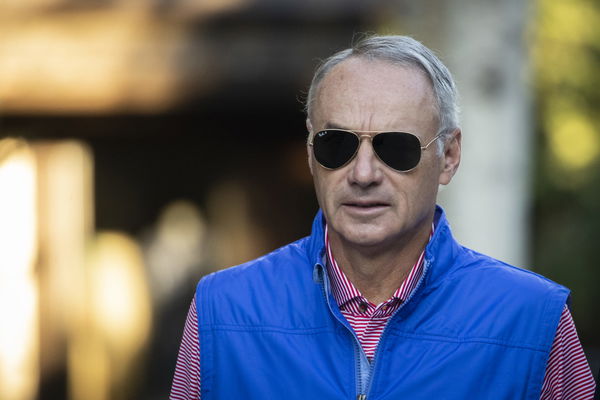

As the Los Angeles Dodgers gear up to break records in the 2025 season, their projected half-billion-dollar spend on player salaries, benefits, and luxury taxes is a statement that cannot be ignored. A staggering $138 million is earmarked for luxury taxes alone—more than the Opening Day payroll of 13 MLB teams’ last season combined!
Naturally, the question on everyone’s mind is: Will this cause a rift in the sport? At the MLB owners’ meetings, we sought answers, but Commissioner Rob Manfred, the man hired to steer the ship, was cautious with his words. In his usual diplomatic fashion, he sidestepped confrontation on the issue, knowing full well that his job was to balance the desires of the 30 team owners, each with their financial strategy.
ADVERTISEMENT
Article continues below this ad
Commissioner Rob Manfred made his stance clear at the MLB owners’ meetings
Rob Manfred offered a measured yet firm response to the growing concerns surrounding the Dodgers’ unprecedented spending spree. However, according to the LA Times, the commissioner didn’t shy away from the broader issue either. “I recognize, however — and my email certainly reflects it — there are fans in other markets who are concerned about their team’s ability to compete. We always have to be concerned when our fans are concerned about something,” Manfred admitted. But when it comes to blaming the Dodgers, Manfred made it clear where he stood: “But pinning it on the Dodgers? I’m not in that camp.”

So, what does this mean for the future of MLB? Is the commissioner simply standing up for the system as it is, or is this a subtle nudge toward future changes? Will smaller market teams be able to compete in a landscape where a handful of organizations flex financial muscle to the extreme?
The commissioner’s words suggest a reluctance to single out the Dodgers for being at the center of this issue. Still, the question remains: Can MLB’s current structure survive an era where a select few teams can buy their way to dominance, or will the balance of power eventually tip too far for the sport to handle?
Everyone raises eyebrows over the Dodgers’ record-breaking spending spree
Some of the league’s most powerful figures have weighed in, including the owners of the Chicago Cubs and New York Yankees. This is a significant development, as money issues in baseball typically draw lines between the owners and players rather than pitting large-market owners against their smaller counterparts. The growing tension among ownership circles speaks volumes about the pressure this financial disparity places on the game.
ADVERTISEMENT
Article continues below this ad
The timing of these concerns is especially critical with the collective bargaining agreement (CBA) set to expire after the 2026 season. If a united front against Dodger-style spending emerges from the owners—especially if it’s aimed at curbing the financial power of top teams—it could set the stage for a seismic shift in the game.
The fear is that this divide could get ugly, and with stakes as high as they are, it could even threaten the 2027 season, a scenario that no one wants to see play out.
Manfred himself acknowledges the growing unease among owners, admitting, “There are some owners that have concerns.” His tone suggests the league is already on alert. “This is an issue that we need to be vigilant on. We need to pay attention to it.”
ADVERTISEMENT
Article continues below this ad
The commissioner is calling for a delicate balancing act. One that would ensure the game remains competitive and healthy moving forward. The question remains: Can MLB find a solution that keeps big-spending powerhouses and struggling franchises on a level playing field, or is the game about to enter a new, more contentious era?
ADVERTISEMENT
ADVERTISEMENT
ADVERTISEMENT
ADVERTISEMENT

